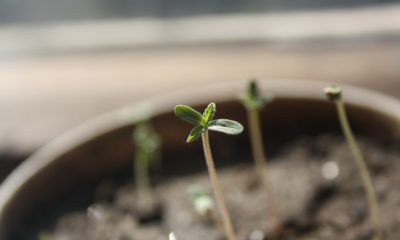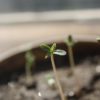Meanwhile, in the South Pacific’s Emerald Triangle…
Puro, New Zealand’s largest medical cannabis operator, is about helping people — and the planet.
Rugged alpine mountains sweep down to thundering waves along the wild Kaikōura Coast in Marlborough, New Zealand. Standing in a field high above the southern Pacific Ocean shoreline, I inhale deeply; the sweetly pungent aroma of sungrown cannabis plants and crisp ocean air surrounds me. An overwhelming sense of déjà vu suddenly hits me — it’s as if I’ve been here before.
I’m on assignment visiting Kēkerengū, the grow operation for Puro, New Zealand’s largest licensed medical cannabis cultivation company. Founded in 2018, Puro is part of an exclusive international group of large-scale commercial growers using organic methods of cultivation. Tiffany Tompkins from Organics Aotearoa New Zealand (OANZ) is also on the tour. As CEO, her mission, she says, is to help OANZ members, including Puro, collaboratively work for organic policies that benefit the health of New Zealand’s people, communities, environment and economy.

Winston Macfarlane, site manager at Puro, explains that Kēkerengū is almost the exact distance from the equator to Humboldt County but along southern latitude lines. Therefore, that same terroir that makes the Emerald Triangle grow some of the world’s best cannabis can also be found here.
Kēkerengū has been home to Macfarlane’s family for more than 130 years. Winston and his older brother Sank Macfarlane, who’s also on Puro’s leadership team, are the sixth generation to farm the 1000-hectare property. Implementing sustainable grow practices, they’re working to grow premium medical cannabis that improves the health and well-being of people, along with the surrounding environment.
Puro’s decision to grow under organic protocols has come from the company’s core values, the younger Macfarlane says. “We’re committed to growing and supplying premium cannabis products as sustainably and ethically as we can.”

Overwhelming evidence shows that synthetic chemicals used in conventional agriculture pose adverse health risks to humans, as well as nasty side effects to the environment. Organic agriculture, on the other hand, works in partnership with nature — it nurtures the health of people and ecosystems. With an emphasis on clean water and creating soil vitality that’s teeming with microscopic life, organic farming encourages the soil rhizosphere to flourish, rather than treating it as an inert monolayer.
As Macfarlane leads us across the farm toward the fields of cannabis, Tompkins can’t hide her enthusiasm. “It’s really exciting to see this brand-new medical cannabis industry emerging in New Zealand. Puro is setting a new precedent for organic cultivation,” she said.
It’s late summer on the flat plateau at Kēkerengū, and the plants are thriving in their microenvironment. The grow offers high UV ratings and long sunshine hours, while the salty sea spray provides a natural anti-bacterial layer, helping to keep insect and pest numbers low.

Puro’s Managing Director Tim Aldridge and Commercial Cultivation Lead Max Jablonski join us in the fields. We walk through the rows of fragrant bushes, inspecting the beauty and bounty of the flourishing pink-pistil plants, and Jablonski starts telling me about his life before New Zealand: He was working at Caliva, a vertically integrated cannabis company in California, where he focused on postharvest, cultivation and fertigation. Turns out we have a few mutual connections; again, California doesn’t seem all that far away.
“Kēkerengū provides perfect growing conditions, with a coastal microclimate that’s ideal for medical cannabis production,” Aldridge said, adding that he and his team believe New Zealand has the potential to produce some of the best cannabis in the world. Cannabis grown under organic protocols in New Zealand has piqued international interest, and Puro is currently finalizing its first export orders. According to Aldridge, the government has been extremely helpful, especially the New Zealand Trade and Enterprise.

Aldridge also reveals that Puro’s Cultivation Director, Tom Forrest, is leading a research and breeding program with geneticist Dr. Anna Campbell from AbacusBio, a world-class genetics company. Using a scientifically driven quantitative breeding program, the two are developing a seed bank of consistent medical cultivars that are adaptable to organic cultivation methods, alongside traditionally important traits such as yield and potency.
A Churchill Fellow for Cannabis Agronomy, Forrest has spent time at over 50 cannabis cultivation facilities across eight countries, examining differing approaches and optimal methods for growing cannabis. Under his leadership, Puro has been awarded an “In Conversion’’ organic certification.
“After informal experiments with various living soil methodologies and forays into the world of permaculture, it became very evident that organic cultivation is a necessary part of our future,” Forrest later tells me on the phone after my visit. “Although it’s still somewhat anecdotal evidence, we’re confident that biological, natural and organic cultivation methods will encourage healthier growth with more desirable secondary metabolite production — higher concentrations of terpenes, flavonoids and cannabinoids.”
Raised in a conventional farming family, Forrest says he’s always wanted to challenge traditional modern agriculture and find a more progressive means of cultivating healthy food and medicine.

“Natural products have been intertwined with pharmaceutical practice since the dawn of mankind,” he said. “Our first recorded medicines were all plant-based and organically produced. Herbal medicines are now a powerful voice in the pharmaceutical portfolio, and cannabis has a strong role to play.”
We agree about the sheer beauty of the outdoor cultivation site at Kēkerengū, and we discuss Puro’s overarching plans to improve the land, soil and environment while contributing to a healthier future for both plants and people. Forrest believes the relationship between organic cannabis and the local environment, the benefits for the farm and farmers, and the influence of terroir on cannabis expression are all strong arguments for organic cannabis.
“Organic and sustainable medical cannabis cultivation are two of our core values,” Forrest said. “We aim to improve the land, soil and environment of our growing locations and contribute to a healthier future.”
This story was originally published in the print edition of Cannabis Now.



























